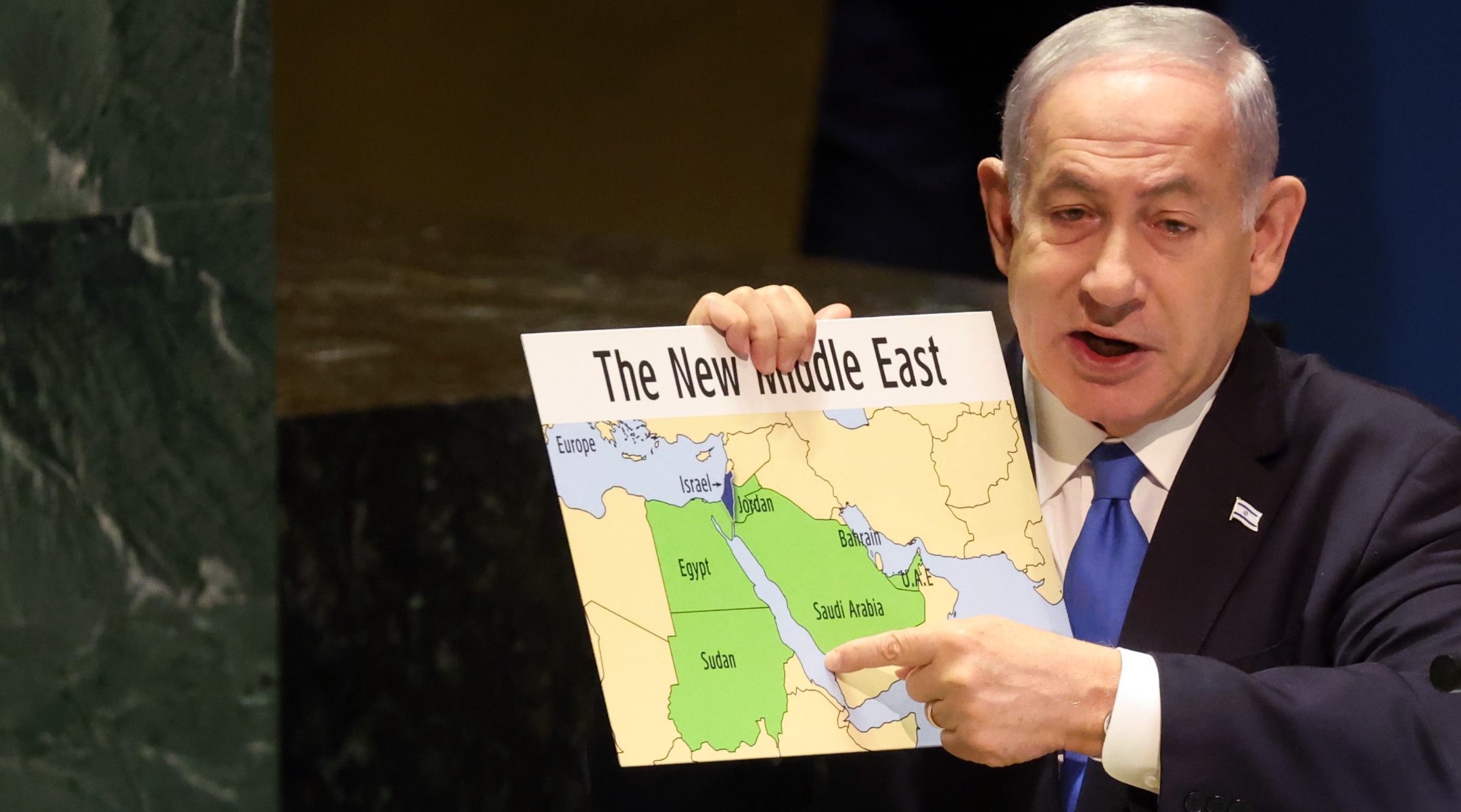Netanyahu touts future accord with Saudi Arabia — and perhaps the Palestinians — in UN speech
He also used the end of his 25-minute speech to herald the benefits — and warn of the dangers — of artificial intelligence

Prime Minister Benjamin Netanyahu addresses world leaders during the United Nations General Assembly in New York City, Sept. 22, 2023. (Spencer Platt/Getty Images)
(JTA) — Benjamin Netanyahu used his address to the United Nations to tout the prospect of a diplomatic agreement between Israel and Saudi Arabia, and to broach a topic that he has previously downplayed: Israeli-Palestinian peace.
He also used the end of his 25-minute speech to herald the benefits — and warn of the dangers — of artificial intelligence, largely reprising what he told tech mogul Elon Musk in a live streamed conversation earlier in the week. And he did not mention one burning issue that has preoccupied Israeli politics — and led to civil strife — all year: his effort to weaken Israel’s Supreme Court.
In the past, Netanyahu has used the address to the U.N. General Assembly to warn of the threat posed by a nuclear Iran — once famously brandishing a picture of a cartoon bomb to show how close the Iranians were to obtaining a nuclear weapon. He warned of Iran’s dangers on Friday again, and also brandished a prop.
But this time, the visual aid was meant to spread a more optimistic message — demonstrating the growing number of Middle Eastern countries with which Israel has signed normalization agreements.
“Peace between Israel and Saudi Arabia will truly create a new Middle East,” Netanyahu said, borrowing a phrase that the late Shimon Peres, one of Netanyahu’s former rivals, had used to discuss Israel-Palestinian peace.
Netanyahu added, “Now as the circle of peace expands, I believe that a real path towards a genuine peace with our Palestinian neighbors can finally be achieved.”
The speech came as President Joe Biden’s administration has prioritized brokering an agreement between Israel and Saudi Arabia, something Netanyahu has long sought. That agreement would likely require Israel to make concessions to the Palestinian Authority in the West Bank, but it remains unclear what they would be.
As he has in the past, Netanyahu sought in the speech to turn upside down what had long been the conventional wisdom — that Israeli-Palestinian peace must be a predicate for a broader peace in the Middle East. Israel’s 2020 normalization agreements with four Arab countries, called the Abraham Accords, disproved that theory, he said.
“For years, my approach to peace was rejected by the so-called experts. Well, they were wrong,” he said. “The Abraham Accords heralded the dawn of a new age of peace.”
While holding his map, Netanyahu used a red marker to draw a potential trade corridor from India to Europe, with Saudi Arabia and Israel as hubs — a plan proposed by Biden that Netanyahu has enthusiastically endorsed.
“We will not only bring down barriers between Israel and our neighbors, we will build a new corridor of peace and prosperity that connects Asia through the UAE, Saudi Arabia, Jordan, Israel to Europe,” he said. “This is an extraordinary change, a monumental change and another pivot of history.”
Palestinian demands have featured prominently in the discussions surrounding a possible Saudi-Israeli deal. A day before Netanyahu spoke to the United Nations, Palestinian Authority president Mahmoud Abbas in his speech said that peace with the Palestinians was a prerequisite for a broader peace. This year, Saudi leadership helped organize a side conference at the United Nations aimed at reviving the establishment of a Palestinian state as a realistic goal.
And according to the White House readout of Biden’s meeting with Netanyahu on Wednesday, the president told Netanyahu that it was essential to preserve prospects for Palestinian statehood, particularly in the face of escalating Israeli-Palestinian violence this year. The president called on both sides to refrain from “unilateral measures,” which includes Israel halting the West Bank settlement expansion championed by Netanyahu’s far-right partners.
Netanyahu opposes the establishment of an independent Palestinian state, and has often cast Israeli-Palestinian relations as a problem to be managed rather than solved. His far-right coalition partners vehemently oppose Palestinian statehood and have said they would bring down the government if he concedes anything significant to the Palestinians. On the map he displayed, the borders of Israel included all of the West Bank as well as Gaza, the Palestinian coastal territory Israel ceded in 2005.
Netanyahu made clear in his speech that he does not believe the Palestinian leadership is ready for peace, condemning in particular a recent speech by Abbas that was widely decried as antisemitic.
“For peace to prevail, the Palestinians must stop spewing Jew hatred, and finally reconcile themselves to the Jewish state,” he said. “By that I mean not only to the existence of the Jewish state, but to the right of the Jewish people to have a state of their own in their historic homeland, the land of Israel.”
But Friday’s speech still marked a shift, in projecting an Israeli-Palestinian deal as a possible outcome of normalization with other Arab countries. He said the word “Palestinian” more than a dozen times throughout the speech.
“There are many hurdles on the path to peace,” he said. “But I’m committed to doing everything I can to overcome these hurdles, to forge a better future for Israel and all the peoples in our region.”
This article originally appeared on JTA.org.














